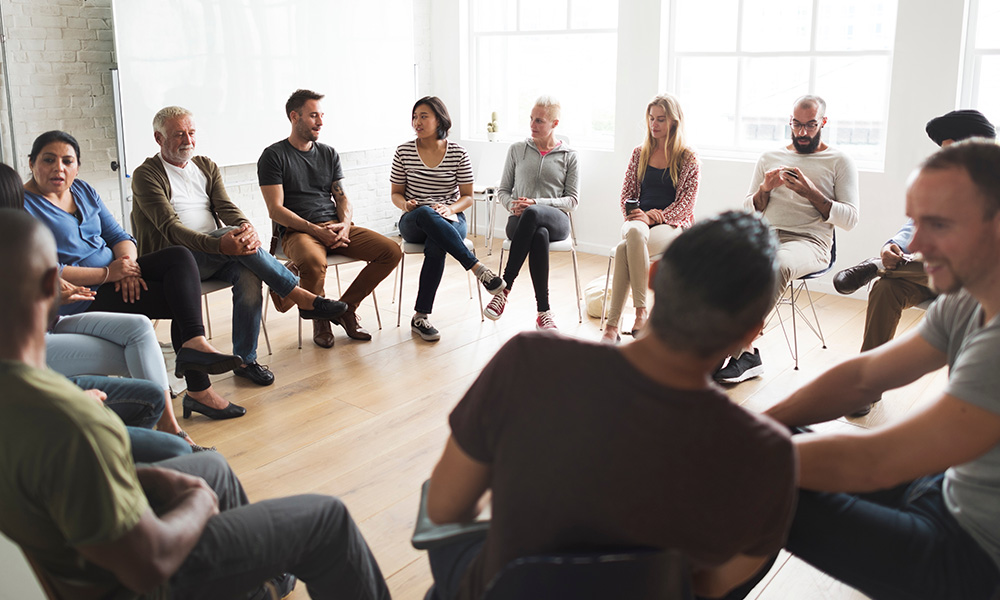Foundation Course in Facilitation Skills
By Gina Blackie…
A Remarkable Journey of Self-Discovery
I signed up to the AoF’s Foundation Course in Facilitation Skills with a degree of anticipation but also trepidation. Would everyone have more experience than me? Was I a good facilitator or not? Over the five day course my eyes were truly opened to the strengths and weaknesses in my approach. I felt challenged by my learning and left with many thoughts on how to improve my style.
Quite quickly as the course progressed I realised that my twenty years of attending and leading meetings, and whether they were ‘successful’ or not was more down to good luck than skill. Although I had picked up some admirable skills in terms of listening and observing they were really on quite a superficial level. It became clear my style was very hierarchical and when I ‘cut to the chase’ I was stifling those around me…

Unlike on other training courses, the AoF team actually demonstrate the skills you are learning about as you proceed through the course thereby modelling excellence in facilitation skills and group dynamics. Often training courses just ‘talk you through the overhead’, there is no such thing as an overhead or slide on this course. A flip chart was used sparingly and course notes for reference only.
And yet, several months on I remember more about the course and what I learnt than any other I have ever attended. The learning was so imbedded in the experience that it would be impossible to forget it or the other people present.
We learnt about the different models and modes of facilitation – from Hamburger and the six dimensions of facilitation (adapted from John Heron 2001), through to Tuckman and Jensen’s Stages of Group Formation (1977). But the focus throughout was on experiential learning and as my first real experience of this it was surprising in many ways.
Although I thought I understood the term ‘experiential learning’ I don’t think I really appreciated what it meant until day four of the course when the group found itself leaderless. We quickly came to logger heads debating what we should be doing. The discomfort felt by each member of the team was palpable. Could I work a way through this and see what I needed to see? My old self wanted to take charge and move the debate on to where I thought it should go. Then slowly it dawned on me that we were ‘the difficult group’. Rather than shout, ‘Get me out of here quick’, I needed to be able to ‘sit with’ the discomfort and work with it.
I felt in free fall but it turned out to be a good place to learn. We had in fact just experienced the ‘storming’ stage of group formation as developed by Tuckman and Jensen – we were on the way to becoming a higher performing group. From then on we worked in a more cohesive way as everyone had articulated their feelings, and a deeper trust was established between us.
Having ‘sat’ in my own difficult group I know I will be able to facilitate the next group that finds itself in that position better. Knowing what it feels like will allow me to be more mindful of the situation and not panic and fall into my old hierarchical style of facilitation. The discomfort and raised blood pressure was worth it as I now feel considerably wiser.
From a personal perspective the course taught me to ‘look beneath the surface’ to see what might be motivating individuals in a meeting – appreciating that each person’s values and ethics are likely to be different to my own, so they will react differently to what is said and done in the meeting.
I practised being more mindful of myself in my role as a facilitator. I now ask myself to focus on how I feel at the start of a meeting, and what impact how I am feeling is likely to have on those around me. I can see clearly how I need to adapt my facilitation style so that it appropriately meets the aims, needs, level of experience, duration and context of a given group.
The course gave me some very practical information on best practice, then actual practise at adapting my personal style of facilitation. For example, learning how to ‘confront gently’ has been a revelation in both my working and personal life.
And what of self and peer assessment? When we first discussed this method of accrediting our work I have to confess I was a little sceptical. Wasn’t it simply a case of dotting the i’s and crossing the t’s – I couldn’t imagine anyone really saying, ‘No Gina, you aren’t good enough to have achieved Level 1 Accreditation.’ How wrong I was. The accreditation day was the most challenging of all.
Presenting your personal view of yourself and where you want to go, and how you want to improve your facilitation skills, and then having this challenged is an emotional journey of self-discovery. Everyone rightly gave honest and challenging feedback, as well as due praise and affirmation. Tears were shed on the final day, which for me was testament to the amount of emotional energy and hard work that everyone put into the course, and how it touched our innate desire for self-improvement.
Many training courses say they will re-energise you and give you lots to think about, but all too often you return to your work and the job overwhelms. The AoF course was different. It was a journey as much about self as about facilitation and group dynamics. I see now that to be a truly exceptional facilitator you must understand yourself, before you can understand those you are facilitating.
